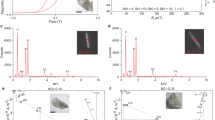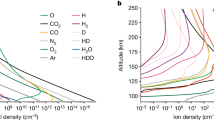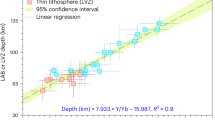Abstract
A model for convection in the upper mantle of the Earth comprising two flows, one of percolating melt fluid (which need be no more than a small volume fraction in the intergranular channels of coherent solid matter), the other a solid plastic flow, avoids some paradoxical features of other models for mantle convection. This model leads to a reasonably consistent account of the processes of continental drift.
This is a preview of subscription content, access via your institution
Access options
Subscribe to this journal
Receive 51 print issues and online access
$199.00 per year
only $3.90 per issue
Buy this article
- Purchase on Springer Link
- Instant access to full article PDF
Prices may be subject to local taxes which are calculated during checkout
Similar content being viewed by others
References
Jacobs, J. A., Russell, R. D., and Wilson, J. T., Physics and Geology (McGraw-Hill, New York, 1959).
Blackett, P. M. S., Bullard, E., and Runcorn, S. K., A Symposium on Continental Drift, Phil. Trans. Roy. Soc., A, 258, 1 (1965).
Upper Mantle Meeting, University of Newcastle, 1966, Geophys. J. Roy. Astro. Soc., 14, Nos. 1–4 (1967); also published as Non-Elastic Processes in the Earth's Mantle (edit. by Tozer, D. C.) (Blackwell, Oxford, 1968).
Author information
Authors and Affiliations
Rights and permissions
About this article
Cite this article
FRANK, F. Two-component Flow Model for Convection in the Earth's Upper Mantle. Nature 220, 350–352 (1968). https://doi.org/10.1038/220350a0
Received:
Published:
Issue Date:
DOI: https://doi.org/10.1038/220350a0
This article is cited by
-
Dihedral angle measurements and infiltration property of SiO2-rich melts in mantle peridotite assemblages
Contributions to Mineralogy and Petrology (2004)
-
The permeability controlled accumulation of primary magma
Contributions to Mineralogy and Petrology (1982)
-
Energy sources for mantle plumes
Geologische Rundschau (1981)
Comments
By submitting a comment you agree to abide by our Terms and Community Guidelines. If you find something abusive or that does not comply with our terms or guidelines please flag it as inappropriate.



